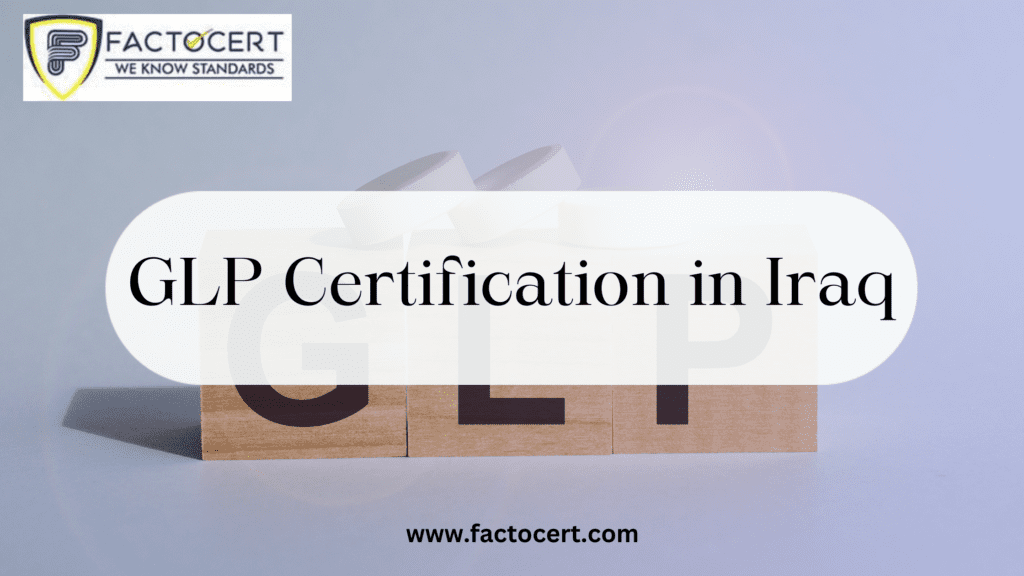GLP Certification in Iraq In the ever-changing world of scientific research and pharmaceutical development, strict quality requirements are critical. Two sets of regulations govern these industries’ laboratory testing: Good Laboratory Practices (GLP) and Good Manufacturing Practices (GMP). While both seek to assure the reliability and integrity of experimental data, they serve diverse functions and are applicable at various phases of the product development lifecycle. In this article, we will look at GLP Certification, the details of GLP and GMP laboratory testing requirements, and the main distinctions between the two.
GLP Certification: An Overview
Good Laboratory Practices (GLPs) are a collection of rules and principles developed to maintain the quality and integrity of non-clinical laboratory investigations. These investigations are critical for determining the safety and effectiveness of medications, chemicals, and other items before they reach the market. GLP Certification is basically a seal of approval, showing that a laboratory follows the required standards and processes.
The primary goals of GLP Certification include maintaining a systematic and structured approach to laboratory testing, documenting all phases of the research, and assuring the traceability and reproducibility of outcomes. Compliance with GLP is critical for regulatory submissions to health authorities because it increases the reliability of data collected during preclinical testing.
GLP Certification Laboratory Testing Regulations: Key Elements.
Quality Assurance (QA): GLP requires the formation of a strong Quality Assurance unit inside a laboratory. This section is in charge of evaluating current research, guaranteeing conformity with GLP principles, and checking that all records and procedures are properly kept.
Standard Operating Procedures (SOPs): GLP stresses the development and implementation of precise SOPs for all phases of laboratory testing. These processes include sample handling, data recording, equipment calibration, and worker training, among other important features.
Facility and Equipment Standards: GLP requires labs to have adequate facilities and equipment for performing non-clinical investigations. This involves periodically calibrating equipment, controlling conditions, and implementing safety precautions.
Research documenting: A fundamental concept of GLP is the thorough documenting of all aspects of research. This includes documenting research methods, raw data, observations, and any deviations from standard procedures. Proper documentation is critical for the replication and confirmation of research findings.
Staff Training: GLP requires that all staff participating in laboratory testing have proper training for their duties. This guarantees that the persons performing tests have the requisite skills and expertise to carry out procedures correctly.
GMP Certification Laboratory Testing Regulations: Understanding the Basics
Unlike GLP Certification, Good Manufacturing Practices (GMP) largely oversee the production procedures of medicines, medical devices, and other regulated goods. While GLP Certification focuses on the dependability of preclinical data, GMP is concerned with the consistency and quality of the finished product. GMP applies to a variety of sectors, including pharmaceuticals, biotechnology, and food processing.
GMP laboratory testing requirements need the following key elements:
Quality Control (QC): GMP stresses the need for QC testing throughout the production process. This includes sampling and testing raw ingredients, in-process samples, and completed products to verify they meet requirements and standards.
Documentation and record-keeping: Like GLP, GMP puts a strong focus on documentation and record-keeping. Accurate and accurate records are essential for establishing compliance with GMP regulations and performing successful batch evaluations.
Validation of Analytical Techniques: GMP requires the validation of analytical techniques used for testing and quality control. This guarantees that the procedures used are appropriate for the intended purpose and provide repeatable outcomes.
GMP demands that equipment used in the production and testing processes be calibrated and maintained on a regular basis. This assures the precision and dependability of instruments, which contributes to the overall quality of the finished product.
Staff Training and Hygiene: GMP standards specify severe criteria for staff training and hygiene in order to reduce the possibility of contamination or mistakes during the production and testing operations.
Distinctions Between GLP Certification and GMP Laboratory Testing Regulations
Scope and purpose:
GLP: Ensures the reliability and integrity of non-clinical laboratory tests undertaken throughout the research and development phase.
GMP: Focuses on ensuring the quality and consistency of manufacturing processes and finished products.
Application:
GLP is mostly useful to labs doing preclinical investigations to support regulatory applications.
GMP refers to the manufacturing facilities and procedures that produce regulated items for commercial distribution.
Data versus Product Quality:
GLP: Focuses on the quality of data obtained during laboratory research.
GMP emphasises the end product’s quality and uniformity.
Timing of implementation:
GLP: Used during the research and development stage before a product is manufactured.
GMP: Implemented throughout the manufacturing process and maintained throughout the product’s life cycle.
Regulatory agencies:
GLP: Frequently connected with regulatory organisations that regulate preclinical testing, such as the United States Food & Drug Administration (FDA) or the European Medicines Agency (EMA).
GMPs are regulated by bodies that control product manufacture, such as the FDA or the European Medicines Agency (EMA).
Why choose Factocert GLP Certification in Iraq?
Factocert is one of the top leading GLP Certification providers in Iraq. We provide the best GLP Consultants in iraq, Baghdad, Mosul, Basra, Erbil, Najaf, Karbala, and other major cities in Iraq.factocert is the most trusted GLP Certification Bodies in Iraq visit our website www.factocert.com or contact us at contact@factocert.com for service of implementation, training, auditing, and registration.We provide different ISO Standards like ISO 27001,ISO 9001,ISO 45001 ,ISO 14001,ISO 13485,ISO 22000,and ISO 17025.
Conclusion
GLP Certification and GMP laboratory testing requirements are critical in Iraq in assuring the dependability, consistency, and quality of scientific data and produced goods, respectively. While GLP focuses on preclinical research, GMP takes centre stage in the manufacture and commercialization of regulated goods. In order to effectively traverse the complicated regulatory environment, laboratories and manufacturing facilities must follow their requirements. Understanding the subtleties of GLP and GMP allows stakeholders to establish a compliance culture and contribute to the development and delivery of safe and effective goods to market.
For More information visit : GLP Certification in Iraq





